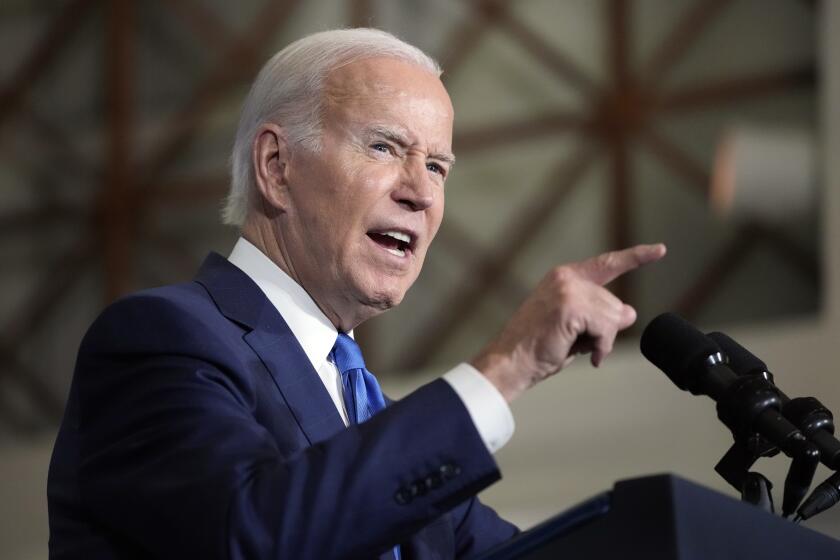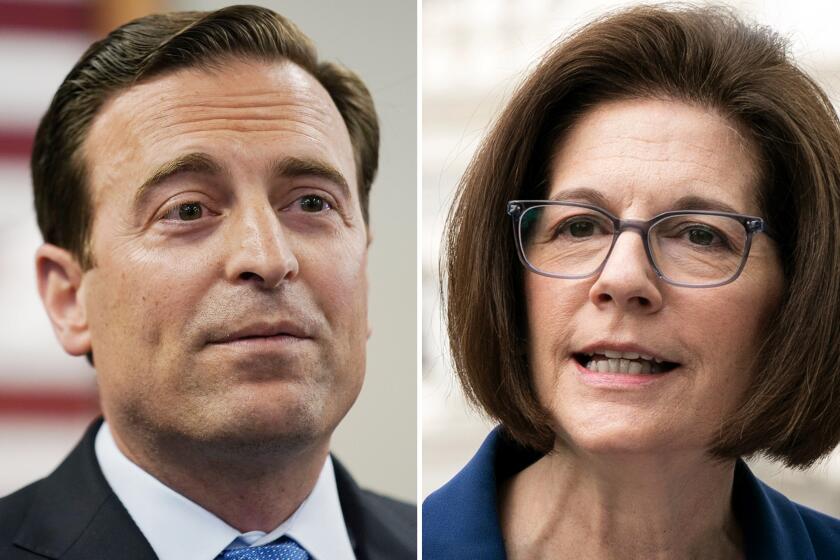Column: Get ready for election month: Trump’s election denialism spreads to this year’s GOP candidates

WASHINGTON — Don’t expect to learn the results of this year’s midterm contests on election night.
Just as in 2020, we’re in for a drawn-out election week, followed by election month — or even months.
One reason is the popularity of mail-in ballots and the infuriating oddity that some states wait until all the polls are closed to begin counting them.
But this year’s results are also likely to be delayed by a pernicious practice: election denialism among Republican candidates loyal to former President Trump.
For them, it’s not enough to endorse Trump’s baseless insistence that he was the real winner of the 2020 presidential election — a bogus claim that has become a tenet of GOP faith.
Some election deniers sound ready to emulate their exiled leader if they, too, come up short.
When reporters ask these candidates whether they’ll accept the results if they lose, they evade or obfuscate.
Democrats and Republicans agree that democracy faces a crisis, but they disagree about the nature of the threat, and each side blames the other.
“I sure hope I can,” said Sen. Ron Johnson of Wisconsin, who’s in a tight race for reelection. “But I can’t predict what the Democrats might have planned,” he added, suggesting they may try “to make it easier to cheat.”
That’s not exactly a “yes.”
Kari Lake, the Trump-backed candidate for governor of Arizona, added a Trump-style caveat.
Kari Lake was a television news anchor in Phoenix for decades. Now, the Arizona gubernatorial candidate bashes the media as propagandists and uses her on-air savvy to rally Trump supporters.
“I’m going to win the election, and I will accept that result,” she said.
Arizona secretary of state candidate Mark Finchem was more direct: “Ain’t going to be no concession speech coming from this guy.”
On one level, it sounds as if all of these candidates are simply modeling themselves after Trump, who refused to commit to accepting election results in 2016 and 2020. (He eventually accepted the 2016 outcome, which he won, but still insisted that the vote had been rigged against him.)
But their preemptive refusals also prepare the way for a blizzard of postelection challenges in the courts — which is, of course, every candidate’s legal right. GOP officials, leaving nothing to chance, say they have already recruited more election lawyers than ever before.
After the 2020 election, Trump and his lawyers filed more than 60 lawsuits to try to overturn the results — and lost all but one.
This time, the political climate could influence the outcomes, UC Irvine law professor Richard L. Hasen worries.
“Pressure may come to bear on state judges and state supreme court justices, many of whom are elected officials and know that the Republican base is full of election deniers,” Hasen wrote in the Atlantic last week.
Another election expert, Rachel Orey of the Bipartisan Policy Center think tank, worries about a different scenario: GOP-dominated election boards at the county or state level could simply refuse to certify results they don’t like.
That happened in New Mexico and Pennsylvania after this year’s primary elections, although state supreme courts reversed the boards’ actions.
In an age of tribalization, are there limits to party loyalty? Could Herschel Walker, urged to run by Trump, cost Republicans control of the Senate?
Trump-backed Mehmet Oz faces daily trolling on social media; now his campaign is mocking Democrat John Fetterman over his stroke, as key Senate race heats up.
“That’s what’s keeping me up at night,” Orey said. “Certification has traditionally been a routine step … but that part of the process is now being abused by partisan actors to disrupt and delay.”
Not all Republicans have refused to say they would accept defeat. Senate candidates Herschel Walker in Georgia and Dr. Mehmet Oz in Pennsylvania have both said they would accept the voters’ verdict.
In Colorado, GOP Senate candidate Joe O’Dea said not only that he would take defeat like a grown-up, but that Trump should, too.
“We’ve become a nation of whiners and crybabies,” he said in a written statement. “Donald Trump still can’t admit he lost.”
He added, for good measure, that he hopes Trump doesn’t win the GOP presidential nomination if he decides to run in 2024.
That earned him a blast from Trump, who called him a “RINO” — Republican in Name Only.
“MAGA doesn’t Vote for stupid people with big mouths,” the former president wrote on his social media outlet, using an abbreviation for his “Make America Great Again” movement.
O’Dea’s campaign manager, Zack Roday, said the candidate is still taking heat from Trump loyalists.
In Arizona, the bedrock issue of free and fair elections is on the ballot as Trump acolytes vie to seize the state’s election machinery.
“He definitely gets pulled aside and read the riot act,” Roday told me. “But Joe’s a good listener.”
Republicans who concede their races risk being derided as RINOs, while those who challenge the results, even when there’s no credible evidence of fraud, may be rewarded by their party.
And that’s dangerous, Orey warns.
“The incentives are misaligned. Trump taught candidates that election denialism is [an] effective fundraising and campaign tactic,” Orey said. “Candidates who refuse to accept election results with no evidence are putting temporary political gain above the future of American democracy.”
More to Read
Get the L.A. Times Politics newsletter
Deeply reported insights into legislation, politics and policy from Sacramento, Washington and beyond. In your inbox three times per week.
You may occasionally receive promotional content from the Los Angeles Times.




















